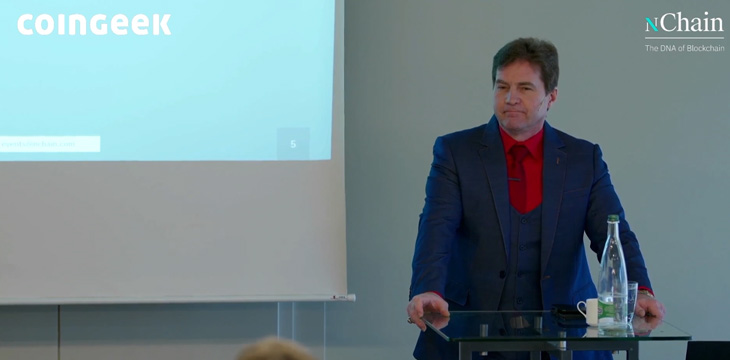|
Getting your Trinity Audio player ready...
|
“One of the biggest problems in any system is ‘garbage in, garbage out,’ and this is a problem with any blockchain,” Dr. Wright begins, opening the third The Bitcoin Masterclasses in Zurich, Switzerland.
Giving an example of how blockchains don’t solve everything, Dr. Wright says to imagine that someone has attested there are 1,000 plates in a kitchen. That doesn’t mean there actually are, but it creates accountability, meaning we can tell who signed to say there are 1,000 plates. Humans and manual processes like checking, weighing boxes, numbering, and itemizing are still needed.
“Bitcoin doesn’t get rid of accountants, contrary to popular belief,” he says, highlighting the need for humans to attest to things and create attributes on a blockchain.
The reason for double-entry accounting was to solve some of the problems with error entry, Dr. Wright goes on. With a double-entry book, two columns need to match, creating a check and a balance. Triple-entry bookkeeping takes this further, recording what is attributable to the transaction.
While accountability is good, things need to go further when it comes to real-world items.
“How do we stop someone manufacturing too many of a given item?” Dr. Wright asks, posing a hypothetical scenario of counterfeiting.
He explains how, in manufacturing hubs like China, some people may take a legitimate order for 10,000 units of a designer bag, fulfill it, but make 10,000 extra items for personal profit. Non-fungible tokens (NFTs) can help prevent this, creating a real-world use case for non-fungible tokens to prove authenticity.
Breaking things down further, Dr. Wright says that each part or item in the manufacturing process can be recorded. Giving the example of his bottle of water, he says we have water coming from somewhere, a bottle, a lid, and a label. All of this can be independently recorded. We can record all of this every step of the way, capturing input and output processes. This is beneficial for product recalls, allowing manufacturers to zero in on and identify problem parts more easily without having to recall entire product lines.
Having accurate information on the blockchain has all sorts of positive consequences for various industries. Giving another example, Dr. Wright points to stolen goods. If they are linked to the blockchain via something like an NFT, when they’re sold, they can be traced and recovered. It also creates accountability for the recipient of stolen goods; if it’s possible to check on the blockchain before purchasing them, then there are no excuses.
Giving another example, Dr. Wright looks at how Roger Ver once sent dangerous goods via air mail, something he was incarcerated for. Right now, senders have to declare that a good is dangerous, and they may say differently from what the manufacturer says. In the sort of blockchain-powered world, Dr. Wright is imagining, falsifying such information would be impossible because it would be visible on the blockchain.
“What I want to do is have everything as a token and move it person to person. As it gets destroyed, it gets de-minted, and it no longer exists, so it’s not part of the economy anymore,” Dr. Wright says, spelling out the big picture.
Once again, Dr. Wright emphasizes that the data has to be accurate for any of these benefits to be realized.
“Garbage in, garbage out,” he reiterates.
Watch: The Bitcoin Masterclasses #3 with Dr. Craig Wright on Sharing the single, central source of truth

 03-01-2026
03-01-2026 




